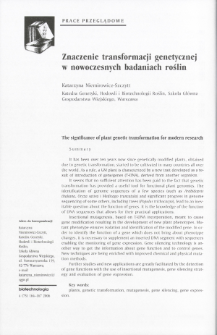- Search in all Repository
- Literature and maps
- Archeology
- Mills database
- Natural sciences
Advanced search
Advanced search
Advanced search
Advanced search
Advanced search

Object
Title: The significance of plant genetic transformation for modern research
Subtitle:
The significance of plant genetic transformation for modern research
Publisher:
Committee on Biotechnology PAS ; Institute of Bioorganic Chemistry PAS
Abstract:
It has been over ten years now since genetically modified plants, obtained due to genetic transformation, started to be cultivated in many countries all over the world. As a rule, a GM plant is characterized by a new trait developed as a result of introduction of gene/genes (T-DNA), derived from another organism. It seems that no sufficient attention has been paid to the fact that genetic transformation has provided a useful tool for functional plant genomics. The identification of genome sequences of a few species (such as Arabidopsis thaliana, Oryza saliva i Medicago truncatula) and significant progress in genome sequencing of some others, including trees (Populus trichocarpa), lead to an inevitable question about the function of genes. It is the knowledge of the function of DNA sequences that allows for their practical applications.
Relation:
Biotechnologia, vol.75, 4 (2006)-.
Volume:
Issue:
Start page:
End page:
Detailed Resource Type:
Format:
Resource Identifier:
0860-7796 ; oai:rcin.org.pl:87237 ; IChB B-71
Source:
Library of Institute of Bioorganic Chemistry PAS
Language:
Language of abstract:
Temporal coverage:
Rights:
Creative Commons Attribution BY-SA 4.0 license
Terms of use:
Digitizing institution:
Institute of Bioorganic Chemistry of the Polish Academy of Science
Original in:
Institute of Bioorganic Chemistry of the Polish Academy of Science
Projects co-financed by:
Access:
Object collections:
- Digital Repository of Scientific Institutes > Partners' collections > Institute of Bioorganic Chemistry PAS > Articles
- Digital Repository of Scientific Institutes > Literature > Journals/Articles
Last modified:
Oct 2, 2020
In our library since:
Dec 7, 2019
Number of object content downloads / hits:
800
All available object's versions:
https://rcin.org.pl./publication/113742
Show description in RDF format:
Show description in RDFa format:
Show description in OAI-PMH format:
| Edition name | Date |
|---|---|
| Znaczenie transformacji genetycznej w nowoczesnych badaniach roślin | Oct 2, 2020 |
Objects Similar
Sławińska, Anna Siwek, Maria
Tyczewska, Agata Bąkowska- Żywicka, Kamila
Pieczyński, Marcin Bielewicz, Dawid Dolata, Jakub Szweykowska-Kulińska, Zofia
Broniarczyk, Justyna Koczorowska, Maria Magdalena Durzyńska, Julia Warowicka, Alicja Goździcka-Józefiak, Anna

 INSTYTUT ARCHEOLOGII I ETNOLOGII POLSKIEJ AKADEMII NAUK
INSTYTUT ARCHEOLOGII I ETNOLOGII POLSKIEJ AKADEMII NAUK
 INSTYTUT BADAŃ LITERACKICH POLSKIEJ AKADEMII NAUK
INSTYTUT BADAŃ LITERACKICH POLSKIEJ AKADEMII NAUK
 INSTYTUT BADAWCZY LEŚNICTWA
INSTYTUT BADAWCZY LEŚNICTWA
 INSTYTUT BIOLOGII DOŚWIADCZALNEJ IM. MARCELEGO NENCKIEGO POLSKIEJ AKADEMII NAUK
INSTYTUT BIOLOGII DOŚWIADCZALNEJ IM. MARCELEGO NENCKIEGO POLSKIEJ AKADEMII NAUK
 INSTYTUT BIOLOGII SSAKÓW POLSKIEJ AKADEMII NAUK
INSTYTUT BIOLOGII SSAKÓW POLSKIEJ AKADEMII NAUK
 INSTYTUT CHEMII FIZYCZNEJ PAN
INSTYTUT CHEMII FIZYCZNEJ PAN
 INSTYTUT CHEMII ORGANICZNEJ PAN
INSTYTUT CHEMII ORGANICZNEJ PAN
 INSTYTUT FILOZOFII I SOCJOLOGII PAN
INSTYTUT FILOZOFII I SOCJOLOGII PAN
 INSTYTUT GEOGRAFII I PRZESTRZENNEGO ZAGOSPODAROWANIA PAN
INSTYTUT GEOGRAFII I PRZESTRZENNEGO ZAGOSPODAROWANIA PAN
 INSTYTUT HISTORII im. TADEUSZA MANTEUFFLA POLSKIEJ AKADEMII NAUK
INSTYTUT HISTORII im. TADEUSZA MANTEUFFLA POLSKIEJ AKADEMII NAUK
 INSTYTUT JĘZYKA POLSKIEGO POLSKIEJ AKADEMII NAUK
INSTYTUT JĘZYKA POLSKIEGO POLSKIEJ AKADEMII NAUK
 INSTYTUT MATEMATYCZNY PAN
INSTYTUT MATEMATYCZNY PAN
 INSTYTUT MEDYCYNY DOŚWIADCZALNEJ I KLINICZNEJ IM.MIROSŁAWA MOSSAKOWSKIEGO POLSKIEJ AKADEMII NAUK
INSTYTUT MEDYCYNY DOŚWIADCZALNEJ I KLINICZNEJ IM.MIROSŁAWA MOSSAKOWSKIEGO POLSKIEJ AKADEMII NAUK
 INSTYTUT PODSTAWOWYCH PROBLEMÓW TECHNIKI PAN
INSTYTUT PODSTAWOWYCH PROBLEMÓW TECHNIKI PAN
 INSTYTUT SLAWISTYKI PAN
INSTYTUT SLAWISTYKI PAN
 SIEĆ BADAWCZA ŁUKASIEWICZ - INSTYTUT TECHNOLOGII MATERIAŁÓW ELEKTRONICZNYCH
SIEĆ BADAWCZA ŁUKASIEWICZ - INSTYTUT TECHNOLOGII MATERIAŁÓW ELEKTRONICZNYCH
 MUZEUM I INSTYTUT ZOOLOGII POLSKIEJ AKADEMII NAUK
MUZEUM I INSTYTUT ZOOLOGII POLSKIEJ AKADEMII NAUK
 INSTYTUT BADAŃ SYSTEMOWYCH PAN
INSTYTUT BADAŃ SYSTEMOWYCH PAN
 INSTYTUT BOTANIKI IM. WŁADYSŁAWA SZAFERA POLSKIEJ AKADEMII NAUK
INSTYTUT BOTANIKI IM. WŁADYSŁAWA SZAFERA POLSKIEJ AKADEMII NAUK


































